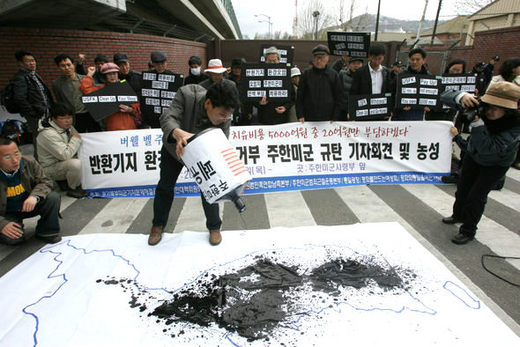 |
|
Protesting environmental pollution, residents stage a demonstration in front of the U.S. Army base in Yongsan, central Seoul.
|
Abandoned electrical systems contain carcinogenic PCBs: report
Electrical transformers containing hazardous materials deserted by U.S. forces when they closed down several bases in South Korea last July are posing a threat to the environment and human health. According to a report submitted by the Ministry of the Environment to lawmakers, a sample test of 17 of 391 deserted transformers located at 10 U.S. camps in the process of being returned from the U.S. to Korea found that transformers at four bases contained PCB levels exceeding the allowed 2 milligrams per liter. At now-defunct Camp Colbern, just south of Seoul, in Hanam, Gyeonggi Province, PCB levels were found to be 88.16 miligrams per liter, about 44 times permitted levels. PCBs, or polychlorinated biphenyls, are chemicals not readily decomposed. They have proven carcinogenic if they accumulate in the human body, and have also been known to cause genetic mutation. PCBs were used in transformers as an additive to enhance the performance of insulating oil, but after they were confirmed as hazards, many countries including South Korea have banned their future use. PCBs are one of 12 hazardous materials, including dioxins and the pesticide DDT, designated in 2001 as dangerous materials by the Stockholm Convention on Persistent Organic Pollutants. In the report, the ministry suspected that around 60 transformers among 391 deserted in above ten bases could contain the material over permitted levels.Previously, U.S. Forces Korea promised to remove all PCBs from South Korea before relocating or closing the ten bases. However, among the total of 444 electric transformers in the ten bases, they classified only 53 as being contaminated with PCBs and left the remaining 391 intact. Late last year, the Ministry of the Environment confirmed the existence of the hazardous material in the areas where U.S. camps used to be located. But the ministry had not released any information about this finding until they verbally addressed the issue with some lawmakers recently. The environment ministry then submitted information regarding the PCB findings over to an environmental panel of SOFA, the status of forces agreement between Seoul and Washington regarding legal matters relating to the U.S. military presence in South Korea. The environment ministry then recommended to the Ministry of National Defense that it should halt proceedings to reclaim the ten bases if the U.S. proves unwilling to take any further measures to ameliorate the problem. The cleanup of the transformers is made especially difficult because it is nearly impossible to pinpoint which transformers in the bases were contaminated with PCBs unless all of the remaining untested 374 transformers are examined. In addition, South Korea does not have the technology to safely remove the PCBs, and must depend on other nations to do so for it. Currently, about 28,000 U.S. troops are stationed in South Korea. The 1950-53 war between the two Koreas ended in an armistice, meaning the nations are still technically at war. Please direct questions or comments to [englishhani@hani.co.kr]






